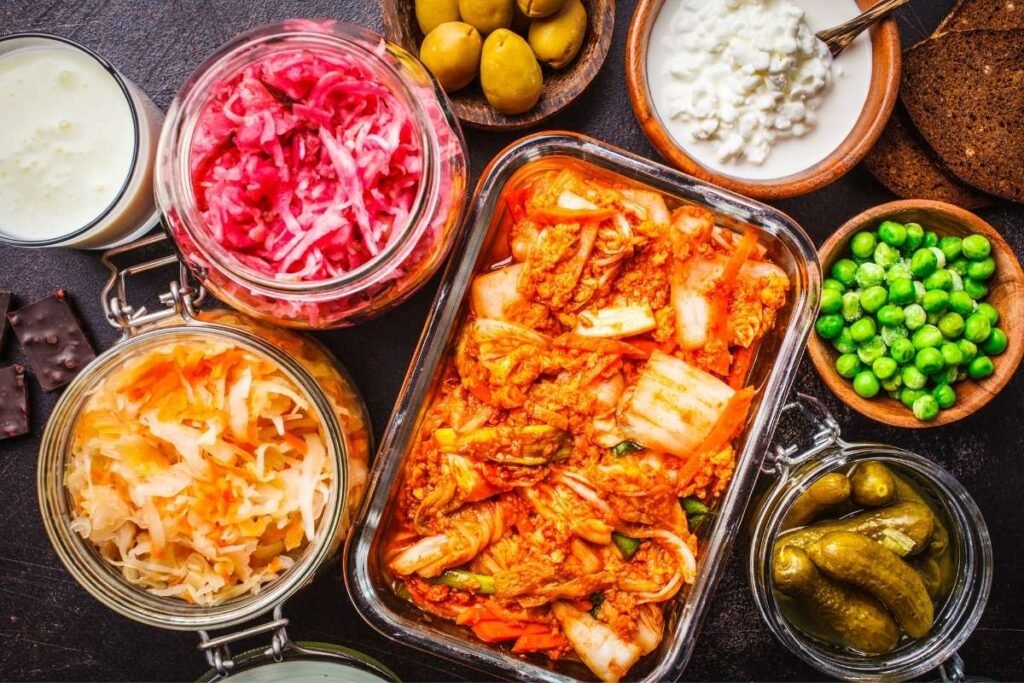How we eat determines our health. No wonder eating healthy is constantly drilled into us. A healthy gut is a reflection of good immunity, balanced hormones, and strong energy levels in the body. The gut microbiome plays a significant role in our complex digestive system. It contains healthy bacteria, yeasts, and microbes that carry out primary functions in the body.
So, how do you maintain a healthy gut? You don’t have to beat your head too much about it. All you must do is turn to fermented foods for gut health. Fermented foods are made when friendly bacteria or yeast are added to milk, vegetables, or even tea. For instance, adding yeast to sweetened tea turns it into kombucha, while certain bacteria can change milk into yogurt. People have been fermenting foods for thousands of years to make food last longer. These days, though, more and more people are eating fermented foods because they’re said to support better health.
In this article, we have carefully curated a list of the 10 best fermented foods for gut health that you should consider including in your diet, and discuss who should eat them (and who should avoid)to help you get started. If you’ve been curious about reclaiming your health from the inside out, this is where you begin.
Also Read :- The Happy Diet: Here are the 7 types of foods that could boost your serotonin levels
What are Fermented Foods?
Fermented foods have undergone a natural metabolic process where microorganisms, mainly bacteria and yeast, break down sugars and starches into acids, gases, or alcohol. Apart from preserving food, it creates unique flavors and, more importantly, a wealth of beneficial microbes known as probiotics. These microorganisms colonize your gut and help with digestion, nutrient absorption, and immune system support.
The right fermented foods for gut health must contain live and active cultures, which are typically found in refrigerated sections of grocery stores or made at home in small batches. The key here is natural fermentation, not vinegar-based pickling or pasteurized versions.
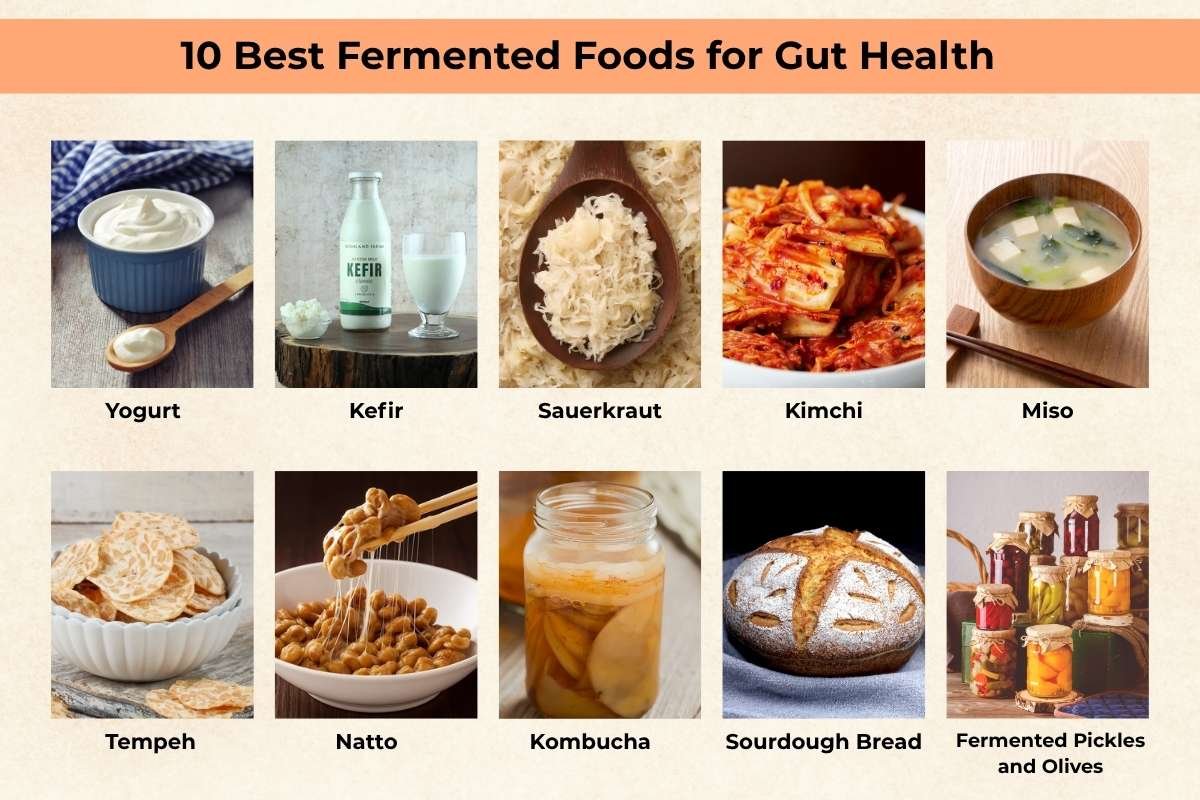
10 Best Fermented Foods for Gut Health
1. Yogurt

Yogurt is a fermented dairy product that contains live bacterial strains such as Lactobacillus bulgaricus and Streptococcus thermophilus, among others. These bacteria actively break down lactose, making yogurt easier to digest than milk for many people, especially those who are lactose intolerant. However, yogurt’s benefits go beyond digestion as it also supports bone health due to its calcium and vitamin D content, and helps replenish the good bacteria your gut needs to stay balanced.
Among all fermented foods for gut health, yogurt is perhaps the most accessible and beginner-friendly option. Make sure to choose plain, unsweetened yogurt with a label that confirms “live and active cultures.” Flavored varieties often come loaded with added sugars that cancel their gut-friendly benefits. Greek yogurt, in particular, is a rich source of protein and makes a perfect base for smoothies, snacks, and breakfast bowls.
2. Kefir
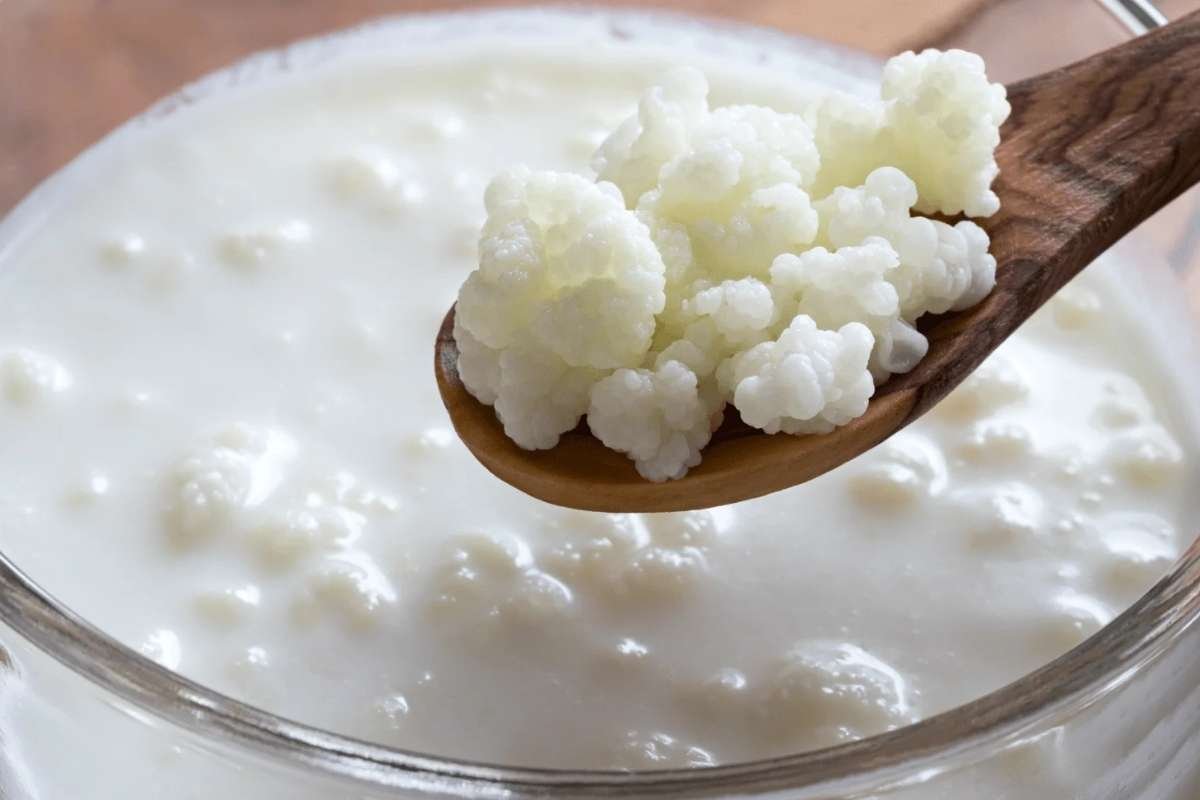
Kefir is like yogurt’s wilder, more powerful cousin. This fermented milk drink is made with kefir “grains”, a combination of bacteria and yeast that look like tiny cauliflower florets. The end product is a tangy, slightly fizzy beverage with a diverse range of probiotics, often 30 or more strains. That’s significantly more than what you’ll find in most yogurts.
Kefir is among the best fermented foods for gut health as it is one of the most potent and clinically tested. Due to its more liquid nature, kefir is easy to incorporate into daily routines, either sipped plain, blended into smoothies, or poured over cereal. It’s also well tolerated by those with lactose sensitivity thanks to the fermentation process that breaks down lactose into simpler sugars. Rich in vitamin B12, calcium, and magnesium, kefir supports gut health, immune regulation, anti-inflammatory processes, and even improved cholesterol profiles.
3. Sauerkraut
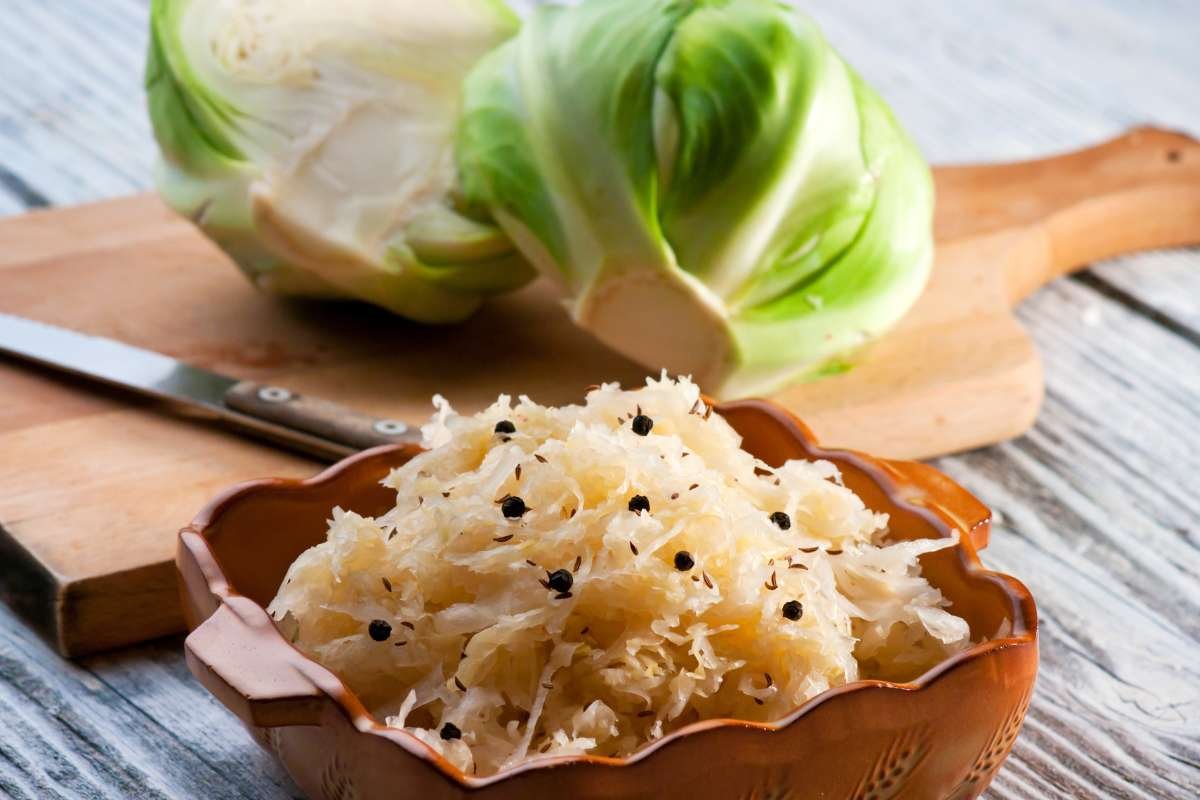
Sauerkraut is fermented cabbage that originated in Central and Eastern Europe. It’s made by finely shredding cabbage and allowing it to ferment with a bit of salt in its own juices. During this lactic acid fermentation, beneficial bacteria like Leuconostoc and Lactobacillus multiply and convert sugars into acids that give sauerkraut its signature tangy flavor.
Sauerkraut adds a crunchy, refreshing bite to any plate and is one of the simplest fermented foods for gut health to start with. Nutritionally, sauerkraut is incredibly potent. It’s low in calories, high in fiber, and rich in vitamins C, K, and B6, as well as antioxidants and iron. More importantly, fermentation introduces millions of live microbes that contribute directly to the gut microbiome. Raw, unpasteurized sauerkraut is where the real benefits lie; heat-treated or canned versions often kill off the good bacteria.
4. Kimchi

Kimchi is a traditional Korean side dish with fermenting vegetables, usually napa cabbage and Korean radish, garlic, ginger, scallions, chili powder, and fish sauce. It’s a complex, spicy, intensely flavorful ferment that has become a global favorite for its bold taste and robust health profile.
Kimchi is rich in Lactobacillus kimchii, a strain unique to its preparation, along with other lactic acid bacteria that support intestinal flora. It’s also high in fiber, antioxidants, and immune-boosting vitamins A and C. Studies show that kimchi can reduce cholesterol levels, aid in weight loss, and improve insulin sensitivity.
While spicy, it can be enjoyed in moderation for those sensitive to heat, added to rice, eggs, or even sandwiches. As a fermented food for gut health, kimchi offers probiotics and anti-inflammatory and antimicrobial properties, making it a holistic addition to your diet.
5. Miso

Miso is a Japanese paste made from fermented soybeans, often mixed with rice or barley and inoculated with a fermentation starter called koji (Aspergillus oryzae). It’s used widely in soups, marinades, and sauces, and has a rich, salty, umami flavor that deepens with age. Being one of the most versatile fermented foods for gut health, miso is perfect for savory cooking and brings depth and nutrition to even the simplest dishes.
Miso contains live enzymes and beneficial bacteria, including Tetragenococcus halophilus, that help improve digestion and gut health. Fermentation also increases the bioavailability of nutrients like zinc, manganese, and B vitamins. It’s worth noting that many store-bought miso soups are made from pasteurized paste, which removes the live microbes, so opt for unpasteurized miso and stir it into warm (not boiling) water to preserve the good bacteria.
6. Tempeh

Tempeh is a dense, cake-like food made from fermented whole soybeans, often bound together with a fuzzy white mold called Rhizopus oligosporus. Unlike tofu, tempeh retains the entire bean, making it higher in fiber, protein, and nutrients like iron, calcium, and potassium.
The fermentation process reduces anti-nutrients like phytic acid, which improves the body’s ability to absorb minerals. Additionally, it produces bioactive peptides and probiotics that promote gut health and may reduce inflammation. Tempeh has a nutty, earthy flavor and a chewy texture that holds up well in stir-fries, salads, sandwiches, or grilled as a meat substitute.
7. Natto

Natto is a lesser-known but highly effective fermented food for gut health. A traditional Japanese food made from fermented soybeans using the bacterium Bacillus subtilis, natto has a strong aroma, sticky texture, and a polarizing flavor profile.
Its nattokinase content, an enzyme linked to heart health and blood clot prevention, sets natto apart. It’s also rich in vitamin K2, which supports bone and cardiovascular health. While the taste may be acquired, natto offers an exceptional probiotic profile that can aid digestion, regulate bowel movements, and reduce harmful bacteria. Often eaten with rice or mustard, natto is best consumed cold and fresh to preserve its living bacteria.
8. Kombucha

Kombucha is a slightly sweet, fizzy drink made from tea fermented with sugar and a SCOBY (symbiotic culture of bacteria and yeast). Over time, the SCOBY consumes the sugar and transforms the tea into a tart, effervescent beverage filled with organic acids, antioxidants, and probiotics.
Kombucha typically contains strains like Gluconacetobacter xylinus and Zygosaccharomyces, which help aid digestion and potentially support liver detoxification. While not as dense in probiotics as yogurt or kefir, its refreshing taste makes it easy to consume regularly.
Commercial options vary widely; some are too sugary or pasteurized, so look for low-sugar, raw, and refrigerated versions to get maximum benefits.
9. Sourdough Bread

Sourdough is bread that ferments dough with wild yeast and lactic acid bacteria. The slow fermentation process breaks down gluten and phytic acid, making sourdough more straightforward to digest than commercial bread and more nutrient-dense.
While baking destroys most live cultures, sourdough still supports gut health by acting as a prebiotic, feeding the good bacteria already in your system. Its lower glycemic index and higher mineral absorption rate make it a better choice for people with blood sugar sensitivity or IBS.
Sourdough won’t replace a probiotic-rich food, but it’s a smart, supportive sidekick in the diverse list of fermented foods for gut health.
10. Fermented Pickles and Olives
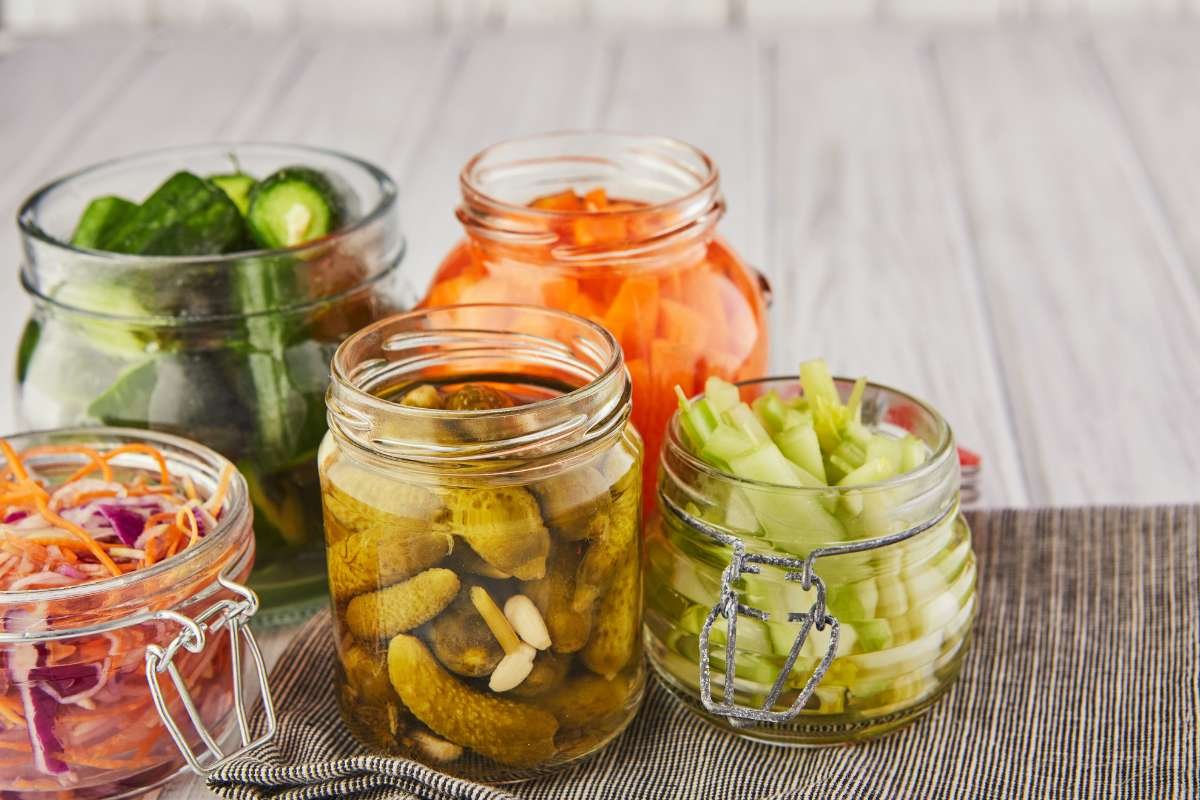
The trick with pickles and olives is avoiding those brined in vinegar. Naturally fermented versions, those left in saltwater brine, undergo lactic acid fermentation, creating tangy, crisp vegetables teeming with Lactobacillus and other beneficial bacteria.
These fermented snacks help increase microbial diversity and aid digestion by introducing live cultures and preserving enzyme activity. Look for phrases like “naturally fermented” or “raw” on labels, and always buy from the refrigerated section. As condiments, they bring crunch, acidity, and a significant health payoff in small servings. They’re an underrated potent source among fermented foods for gut health.
Who Should Eat Fermented Foods, and Who Should Avoid Them?
Fermented foods for gut health are generally safe and beneficial when introduced gradually. They’re invaluable for individuals struggling with bloating, irregular digestion, antibiotic recovery, or low immunity.
However, people with certain conditions should be cautious. Those with histamine intolerance, SIBO (Small Intestinal Bacterial Overgrowth), or severe gut dysbiosis may react poorly. Fermented foods can be high in histamines and may worsen symptoms like headaches, skin issues, or gas.
Immunocompromised individuals or those on restrictive low-FODMAP diets should consult a healthcare professional before including them in their diet.
Conclusion
Fermented foods for gut health have been part of traditional diets for centuries. Today, they’re recognized for supporting digestion, improving gut balance, and helping the body stay healthy. Whether you’re sipping kefir, topping meals with kimchi, or upgrading your sandwich with fermented pickles, each small addition brings living microbes to support your inner ecosystem.
Start slow, pay attention to your body, and aim for diversity. The more fermented varieties you include, the stronger your microbiome becomes.
FAQs
Q: How much fermented food should I eat per day?
A: Start with one small serving (like a spoonful of sauerkraut or half‑cup of yogurt or kefir) and gradually build up to 2–3 servings per day. Research shows benefits in digestion and mood when increasing intake by about three portions.
Q: Can fermented foods cause bloating or gas?
A: Yes, especially at first. These foods bring new live microbes into your gut, and your system may take a week or two to adjust. Begin with small amounts to let your microbiome adapt, and symptoms usually fade.
Q: Are fermented foods safe during pregnancy or for children?
A: Plain yogurt and kefir from pasteurized milk are generally considered safe. Raw or homemade ferments may pose a risk unless prepared hygienically. Always check with your doctor before adding new fermented foods.
Q: Can I cook fermented foods?
A: Cooking can kill live probiotic bacteria. To preserve benefits, add sauerkraut, kimchi, or miso at the end of cooking or enjoy them raw. Yogurt or kefir should be consumed cold.
Q: Do fermented foods replace probiotic supplements?
A: They can, but supplements can offer defined strains and dosages. Fermented foods provide diverse microbes, enzymes, and postbiotics in a natural food matrix. For most people, food is a preferable first choice.
Q: What should I look for on labels?
A: Look for “raw,” “unpasteurized,” or “live and active cultures.” Avoid high sugar or vinegar‑based versions unless they specify live fermentation. Always refrigerate when needed to preserve viability.

